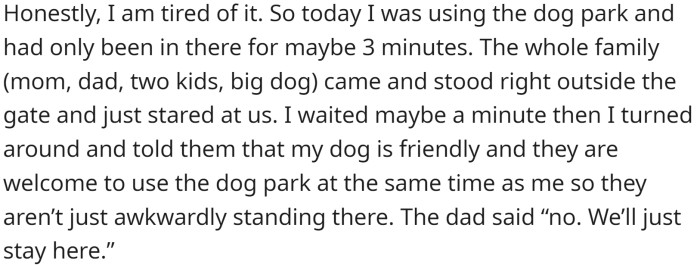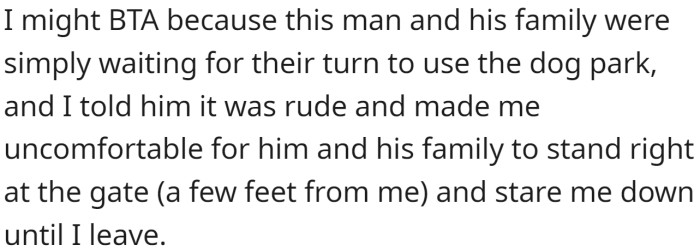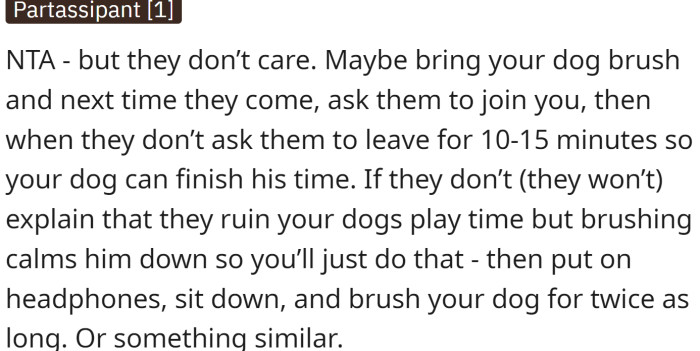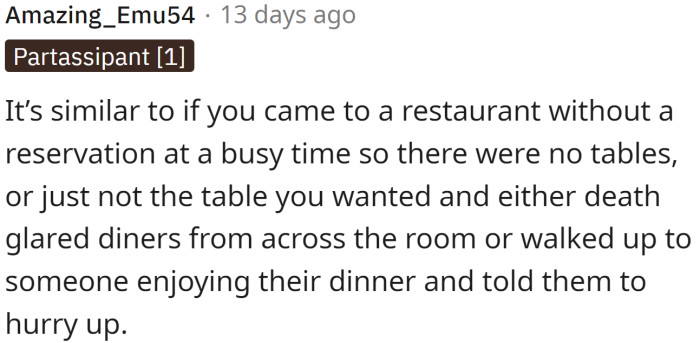Family Waiting Turn At The Small Fenced Dog Park Literally Stares People Away, Finally Gets Confronted By One Redditor
Exercising dogs in cities can be extremely difficult for pet owners, as it often requires navigating a complex set of rules and regulations. Cities typically have limited green space, and local authorities often don’t make it easy for pet owners to find places to exercise their pets.
This can lead to misunderstandings between dog owners over who should have access to certain spaces. Today, we have a story that illustrates this perfectly.
OP lives in an apartment complex with a dog park, but there is an unwritten rule that only one resident can use it at a time. OP has been living there for three years and has seen people come and go, but one family has a habit of waiting right outside the gate, staring at OP and their dog until they feel uncomfortable enough to leave.
OP tried to ignore them, but once the mom loudly said, "Ugh, this girl always takes forever," the dog wouldn't move because he was so fixated on the people and their dog. Today, the same family came and stood outside the gate, and OP told them that their dog was friendly and that they were welcome to use the dog park at the same time as them.
The dad refused, and OP said it was rude to stand there and stare until they left. After the exchange, OP and their dog left almost immediately because the dog was so distracted.
OP is wondering if they were in the wrong for telling the dad that it was rude to stand there and stare at them until they left.
OP asks:

OP lives in an apartment complex with a dog park, but there is an unwritten rule that only one resident can use it at a time.

OP has been living there for three years and has seen people come and go, but one family has a habit of waiting right outside the gate, staring at OP and their dog until they feel uncomfortable enough to leave.

Understanding Impatience in Social Settings
Dr. Michael Lee, a social psychologist, explains that impatience in public settings can often stem from unregulated emotional states. When individuals feel anxious or pressured, they may project these feelings onto others, leading to behaviors that appear aggressive or impatient. Research in the Journal of Personality and Social Psychology has shown that social anxiety can manifest as irritation when individuals feel their own needs are not being met.
This type of impatience can disrupt social harmony and lead to confrontations, particularly in shared spaces like dog parks where social interaction is expected.
Social Dynamics in Shared Spaces
Dr. Robert Cialdini's research on social psychology highlights the concept of social proof, which explains how individuals often look to others to determine appropriate behavior in social situations.
In shared spaces like dog parks, the behavior of others can influence how individuals act, leading to conflicts when expectations are misaligned.
This dynamic can create tension and frustration, especially when individuals feel their needs are not being respected.
OP tried to ignore them, but once the mom loudly said, "Ugh, this girl always takes forever," the dog wouldn't move because he was so fixated on the people and their dog.

OP was annoyed.

OP decided to say something.

Moreover, the phenomenon of social conformity plays a role in these scenarios. Studies indicate that individuals may adapt their behaviors according to the actions of those around them, often succumbing to group dynamics that prioritize impatience over understanding. This can create a toxic environment where aggression is normalized and escalated.
Understanding these dynamics is crucial for fostering a more respectful social atmosphere, where individuals are encouraged to practice patience and empathy towards one another.
According to studies published in the Journal of Social Psychology, group dynamics can significantly impact individual behavior, often leading to social loafing or aggression when group norms are not established.
This can explain why some individuals may feel entitled to claim a space without consideration for others, creating a negative atmosphere.
"Maybe you should come back later."

Dad of the family responded:

Now OP asks:

Strategies for Navigating Social Conflicts
Conflict resolution strategies can greatly benefit individuals who find themselves in these confrontational situations. Techniques such as active listening, where one genuinely seeks to understand the other's perspective, can de-escalate tensions. Research indicates that employing empathy in conflicts reduces feelings of hostility and fosters cooperation.
Moreover, establishing ground rules for shared spaces, such as taking turns and maintaining patience, can help create a more pleasant environment for all involved. Implementing these strategies requires commitment from all parties to prioritize mutual respect and understanding.
The Importance of Turn-Taking
Turn-taking is a fundamental aspect of social interactions, as highlighted by developmental psychologists.
Research indicates that learning to share and take turns is critical for healthy social development in children and adults alike.
When individuals disregard these social norms, it can lead to misunderstandings and conflicts in shared spaces.
OP has offered the following explanation for why they think they might be the a-hole:

They don't care...

This Redditor likes the idea.

Conflict resolution strategies can be beneficial in these scenarios.
Experts recommend employing calm and assertive communication techniques when addressing conflicts in shared spaces.
By clearly expressing one's needs while respecting others, individuals can foster a more harmonious environment.
"They needed to be told about themselves."

This is a great analogy:

The bottom line is:

Building Empathy in Shared Spaces
Fostering empathy in shared spaces can lead to better outcomes for everyone involved.
Research indicates that when individuals make an effort to understand the perspectives of others, it can significantly reduce conflict and enhance community bonds.
This can be particularly effective in environments where many individuals interact, such as dog parks.
In conclusion, it is clear that the resident’s experience of being stared at by the family while using the dog park has been unwelcome and uncomfortable. Although it is understandable that the family is eager to use the park, their behavior is inappropriate and can be seen as intrusive and potentially intimidating.
It is important to remember that people should be respectful of others’ space and time in public areas and that it is perfectly acceptable for someone to speak up if they feel that their boundaries are being crossed.
Ultimately, cultivating a sense of community and shared responsibility in shared spaces can lead to more positive interactions.
By recognizing the needs and rights of others, individuals can contribute to a more enjoyable experience for all.
Active participation in community discussions can also help establish norms and expectations that benefit everyone involved.
Psychological Analysis
This situation illustrates the challenges of navigating social spaces where expectations may not align.
Building awareness of social dynamics and practicing effective communication can significantly improve interactions in shared environments.
Analysis generated by AI
Analysis & Alternative Approaches
In conclusion, understanding the social dynamics at play in shared spaces can help individuals navigate conflicts more effectively.
By fostering empathy and practicing effective communication, we can create a more harmonious environment for all participants.
Promoting awareness of shared responsibilities can lead to a better experience for everyone involved.
Analysis & Alternative Approaches
Conflict in shared spaces often reflects deeper social dynamics that can be addressed through improved communication and empathy. According to studies published in the Journal of Social Psychology, fostering environments that encourage patience and understanding can lead to more harmonious interactions. Ultimately, these changes contribute to a more supportive community.



